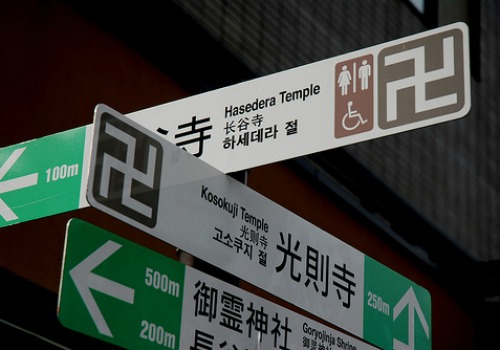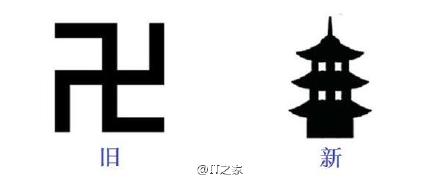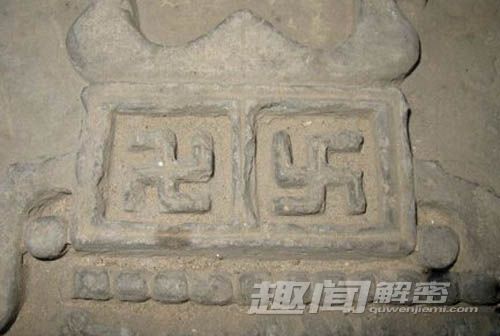China Insight
Pay Attention, Confused Foreigners: ‘Wan’ (卍) is Not a Nazi Symbol
Japan wants to get rid of the Buddhist manji-symbol (卍) on city maps, as foreigners associate it with the Nazi swastika. In China, where the symbol is known as the ‘wan’ character, some netizens seem to find the controversy entertaining.
Published
9 years agoon

Japan’s official map-making organization wants to get rid of the Buddhist manji symbol (卍) that marks the location of temples on city maps, as foreigners associate it with the Nazi swastika. In China, where the symbol is known as the ‘wan’ character, some netizens seem to find the controversy entertaining.
This week several international media, including
the BBC, wrote about the decision of the Japanese map-making association to change its manji symbol on tourist maps.

The 卍-symbol indicates the location of temples, but is often seen as the Nazi swastika by foreigners. With the Rugby World Cup and Olympics taking place in Japan in 2019 and 2020, Japanese authorities deem it is better to remove the symbol in order to avoid any misunderstanding amongst international visitors.
“Ignorant foreign travelers simply don’t understand Buddhist traditions”.
The news was also reported by Chinese media. The manji symbol is used in China as well, where it is a character pronounced as ‘wàn’.
China’s Sohu news writes that the Japanese manji is actually not the same as the Nazi swastika: the first has arms going anticlockwise (卍) whereas the arms of the Nazi symbol go clockwise (卐).
The article says that Hitler’s Nationalist Socialist Party designed the swastika that way because the German words for state and society both start with an S. This is allegedly why they designed the swastika in an S-shape.

Another difference, according to Sohu, is that the Buddhist swastika usually is gold, whereas the Nazi symbol is black.

The confusion between the two symbols is mostly created by foreigners, Sohu writes, who do not know the difference. Japanese netizens reportedly complain about “ignorant foreign travelers”, who simply “do not understand Buddhist traditions”. They should not protest its use – “When in Rome,” they say: “do as the Romans do.”
“By all means, don’t let them come to Chinese Buddhist temples. They’ll go crazy”.
On Chinese social media network Sina Weibo, a netizen called Wuguaixing seems entertained by the news. The micro-blogger, a PhD student at Tokyo University with over 100,000 Weibo followers, writes on his account:
“Ha ha! The much used Buddhist ‘wan’ (卍) character that marks temples on Japanese maps is opposed by foreigners, who think it is the Nazi ‘卐’ symbol. They now want to get rid of it.”
Other Weibo users commented on the post, saying: “Foreign tourists are just not culturally educated at all!” And: “By all means, don’t let them come to Chinese Buddhist temples. They’ll go crazy!”
The symbol can be found in many of China’s temples, either depicted on the Buddha or in ornaments.

The writer of one of the post’s most popular comments wonders why the manji symbol is a problem at all: “Does this centuries-old symbol really need to make way for the Nazi symbol, that is just some decades old?”
One Weibo user remarks: “If this was about any other Asian country, it would be no problem. But because of Japan’s past war crimes, the issue is very sensitive.”
“Where did everyone’s IQ go?!”
Some Weibo users address the history of the symbol: “Strictly speaking, this is an old Hindu symbol that was then used by Buddhism.” This comment is backed up by a netizen nicknamed Black & White, who writes: “The 卍 and the 卐 are two different characters, and they both read as ‘wàn’.”
According to Brittanica Academic, both symbols, either clockwise or anti-clockwise, are referred to as a swastika. It comes from the Sanskrit svastika meaning “conductive to well-being”, and is an ancient symbol of prosperity and good fortune. It represents the revolving sun, fire, or life, Buddhas Online explains.
According to the Encyclopedia Brittanica:
In the Buddhist tradition the swastika symbolizes the feet, or the footprints, of the Buddha. It is often placed at the beginning and end of inscriptions, and modern Tibetan Buddhists use it as a clothing decoration. With the spread of Buddhism, the swastika passed into the iconography of China and Japan, where it has been used to denote plurality, abundance, prosperity, and long life.
The swastika was used as a sign of ‘Aryan race’ in the 19th century, and was adopted by Nazism in the 20th century (Quinn 1994, x).
“Where did everyone’s IQ go?!” one Weibo user wonders.
China’s Ifeng news wrote an article about the swastika and the issue of the clockwise and anticlockwise arms. It explains that Buddhism actually uses the sign in both ways, and they both represent wisdom and compassion.

Although the issue seems more nuanced than a simple (anti)clockwise explanation, for some netizens, it’s not complicated at all: “The 卍 is a Buddhist symbol, and the 卐 is a Nazi symbol, please don’t mix them up.”
– By Manya Koetse
Follow @WhatsOnWeibo
References
Quinn, Malcolm. 1994. The Swastika: Constructing the Symbol. London/New York: Routledge.
Featured image from Flickr: https://c2.staticflickr.com/6/5179/5435812352_e2578ba5b8.jpg
©2016 Whatsonweibo. All rights reserved. Do not reproduce our content without permission – you can contact us at info@whatsonweibo.com.
Manya Koetse is the founder and editor-in-chief of whatsonweibo.com. She is a writer, public speaker, and researcher (Sinologist, MPhil) on social trends, digital developments, and new media in an ever-changing China, with a focus on Chinese society, pop culture, and gender issues. She shares her love for hotpot on hotpotambassador.com. Contact at manya@whatsonweibo.com, or follow on Twitter.

China Insight
The Tragic Story of “Fat Cat”: How a Chinese Gamer’s Suicide Went Viral
The story of ‘Fat Cat’ has become a hot topic in China, sparking widespread sympathy and discussions online.
Published
3 months agoon
May 9, 2024
The tragic story behind the recent suicide of a 21-year-old Chinese gamer nicknamed ‘Fat Cat’ has become a major topic of discussion on Chinese social media, touching upon broader societal issues from unfair gender dynamics to businesses taking advantage of grieving internet users.
The story of a 21-year-old Chinese gamer from Hunan who committed suicide has gone completely viral on Weibo and beyond this week, generating many discussions.
In late April of this year, the young man nicknamed ‘Fat Cat’ (胖猫 Pàng Māo, literally fat or chubby cat), tragically ended his life by jumping into the river near the Chongqing Yangtze River Bridge (重庆长江大桥) following a breakup with his girlfriend. By now, the incident has come to be known as the “Fat Cat Jumping Into the River Incident” (胖猫跳江事件).
News of his suicide soon made its rounds on the internet, and some bloggers started looking into what was behind the story. The man’s sister also spoke out through online channels, and numerous chat records between the young man and his girlfriend emerged online.
One aspect of his story that gained traction in early May is the revelation that the man had invested all his resources into the relationship. Allegedly, he made significant financial sacrifices, giving his girlfriend over 510,000 RMB (approximately 71,000 USD) throughout their relationship, in a time frame of two years.
When his girlfriend ended the relationship, despite all of his efforts, he was devastated and took his own life.
The story was picked up by various Chinese media outlets, and prominent social and political commentator Hu Xijin also wrote a post about Fat Cat, stating the sad story had made him tear up.
As the news spread, it sparked a multitude of hashtags on Weibo, with thousands of netizens pouring out their thoughts and emotions in response to the story.
Playing Games for Love
The main part of this story that is triggering online discussions is how ‘Fat Cat,’ a young man who possessed virtually nothing, managed to provide his girlfriend, who was six years older, with such a significant amount of money – and why he was willing to sacrifice so much in order to do so.
The young man reportedly was able to make money by playing video games, specifically by being a so-called ‘booster’ by playing with others and helping them get to a higher level in multiplayer online battle games.
According to his sister, he started working as a ‘professional’ video gamer as a means of generating money to satisfy his girlfriend, who allegedly always demanded more.
He registered a total of 36 accounts to receive orders to play online games, making 20 yuan per game (about $2.80). Because this consumed all of his time, he barely went out anymore and his social life was dead.
In order to save more money, he tried to keep his own expenses as low as possible, and would only get takeout food for himself for no more than 10 yuan ($1,4). His online avatar was an image of a cat saying “I don’t want to eat vegetables, I want to eat McDonald’s.”

The woman in question who he made so many sacrifices for is named Tan Zhu (谭竹), and she soon became the topic of public scrutiny. In one screenshot of a chat conversation between Tan and her boyfriend that leaked online, she claimed she needed money for various things. The two had agreed to get married later in this year.
Despite of this, she still broke up with him, driving him to jump off the bridge after transferring his remaining 66,000 RMB (9135 USD) to Tan Zhu.
As the story fermented online, Tan Zhu also shared her side of the story. She claimed that she had met ‘Fat Cat’ over two years ago through online gaming and had started a long distance relationship with him. They had actually only met up twice before he moved to Chongqing. She emphasized that financial gain was never a motivating factor in their relationship.
Tan additionally asserted that she had previously repaid 130,000 RMB (18,000 USD) to him and that they had reached a settlement agreement shortly before his tragic death.
Ordering Take-Out to Mourn Fat Cat
– “I hope you rest in peace.”
– “Little fat cat, I hope you’ll be less foolish in your next life.”
– “In your next life, love yourself first.”
These are just a few of the messages left by netizens on notes attached to takeout food deliveries near the Chongqing Yangtze River Bridge.

AI-generated image spread on Chinese social media in connection to the event.
As Fat Cat’s story stirred up significant online discussion, with many expressing sympathy for the young man who rarely indulged in spending on food and drinks, some internet users took the step of ordering McDonalds and other food delivery services to the bridge, where he tragically jumped from, in his honor.
This soon snowballed into more people ordering food and drinks to the bridge, resulting in a constant flow of delivery staff and a pile-up of take-out bags.

Delivery food on the bridge, photo via Weibo.
However, as the food delivery efforts picked up pace, it came to light that some of the deliveries ordered and paid for were either empty or contained something different; certain restaurants, aware of the collective effort to honor the young man, deliberately left the food boxes empty or substituted sodas or tea with tap water.

At least five restaurants were caught not delivering the actual orders. Chinese bubble tea shop ChaPanda was exposed for substituting water for milk tea in their cups. On May 3rd, ChaPanda responded that they had fired the responsible employee.
Another store, the Zhu Xiaoxiao Luosifen (朱小小螺蛳粉), responded on that they had temporarily closed the shop in question to deal with the issue. Chinese fast food chain NewYobo (牛约堡) also acknowledged that at least twenty orders they received were incomplete.
Fast food company Wallace (华莱士) responded to the controversy by stating they had dismissed the employees involved. Mixue Ice Cream & Tea (蜜雪冰城) issued an apology and temporarily closed one of their stores implicated in delivering empty orders.
In the midst of all the controversy, Fat Cat’s sister asked internet users to refrain from ordering take-out food as a means of mourning and honoring her brother.
Nevertheless, take-out food and flowers continued to accumulate near the bridge, prompting local authorities to think of ways of how to deal with this unique method of honoring the deceased gamer.
Gamer Boy Meets Girl
On Chinese social media, this story has also become a topic of debate in the context of gender dynamics and social inequality.
There are some male bloggers who are angry with Tan Zhu, suggesting her behaviour is an example of everything that’s supposedly “wrong” with Chinese women in this day and age.
Others place blame on Fat Cat for believing that he could buy love and maintain a relationship through financial means. This irked some feminist bloggers, who see it as a chauvinistic attitude towards women.
A main, recurring idea in these discussions is that young Chinese men such as Fat Cat, who are at the low end of the social ladder, are actually particularly vulnerable in a fiercely competitive society. Here, a gender imbalance and surplus of unmarried men make it easier for women to potentially exploit those desperate for companionship.
The story of Fat Cat brings back memories of ‘Mo Cha Official,’ a not-so-famous blogger who gained posthumous fame in 2021 when details of his unhappy life surfaced online.
Likewise, the tragic tale of WePhone founder Su Xiangmao (苏享茂) resurfaces. In 2017, the 37-year-old IT entrepreneur from Beijing took his own life, leaving behind a note alleging blackmail by his 29-year-old ex-wife, who demanded 10 million RMB (±1.5 million USD) (read story).
Another aspect of this viral story that is mentioned by netizens is how it gained so much attention during the Chinese May holidays, coinciding with the tragic news of the southern China highway collapse in Guangdong. That major incident resulted in the deaths of at least 48 people, and triggered questions over road safety and flawed construction designs. Some speculate that the prominence given to the Fat Cat story on trending topic lists may have been a deliberate attempt to divert attention away from this incident.
‘Fat Cat’ was cremated. His family stated their intention to take necessary legal steps to recover the money from his former girlfriend, but Tan Zhu reportedly already reached an agreement with the father and settled the case. Nevertheless, the case continues to generate discussions online, with some people wondering: “Is it over yet? Can we talk about something different now?”

Fat Cat images projected in Times Square
However, given that images of the ‘Fat Cat’ avatar have even appeared in Times Square in New York by now (Chinese internet users projected it on one of the big LED screens), it’s likely that this story will be remembered and talked about for some time to come.
UPDATE MAY 25
On May 20, local authorities issued a lengthy report to clarify the timeline of events and details surrounding the death of “Fat Cat,” which had attracted significant attention across China.
The report concluded that there was no fraud involved and that “Fat Cat” and his girlfriend were in a genuine relationship. Tan did not deceive “Fat Cat” for money; the transfers were voluntary. Furthermore, Tan returned most of the money to his parents.
The gamer’s sister is reportedly still being investigated for potentially infringing on Tan’s privacy by disclosing numerous private details to the public.
In the end, one thing is clear in this gamer’s tragic story, which is that there are no winners.
By Manya Koetse
– With contributions by Miranda Barnes and Ruixin Zhang
Independently reporting China trends for over a decade. Like what we do? Support us and get the story behind the hashtag by subscribing:
Spotted a mistake or want to add something? Please let us know in comments below or email us. First-time commenters, please be patient – we will have to manually approve your comment before it appears.
©2024 Whatsonweibo. All rights reserved. Do not reproduce our content without permission – you can contact us at info@whatsonweibo.com.
China Brands, Marketing & Consumers
A Brew of Controversy: Lu Xun and LELECHA’s ‘Smoky’ Oolong Tea
Chinese tea brand LELECHA faced backlash for using the iconic literary figure Lu Xun to promote their “Smoky Oolong” milk tea, sparking controversy over the exploitation of his legacy.
Published
3 months agoon
May 3, 2024
It seemed like such a good idea. For this year’s World Book Day, Chinese tea brand LELECHA (乐乐茶) put a spotlight on Lu Xun (鲁迅, 1881-1936), one of the most celebrated Chinese authors the 20th century and turned him into the the ‘brand ambassador’ of their special new “Smoky Oolong” (烟腔乌龙) milk tea.
LELECHA is a Chinese chain specializing in new-style tea beverages, including bubble tea and fruit tea. It debuted in Shanghai in 2016, and since then, it has expanded rapidly, opening dozens of new stores not only in Shanghai but also in other major cities across China.
Starting on April 23, not only did the LELECHA ‘Smoky Oolong” paper cups feature Lu Xun’s portrait, but also other promotional materials by LELECHA, such as menus and paper bags, accompanied by the slogan: “Old Smoky Oolong, New Youth” (“老烟腔,新青年”). The marketing campaign was a joint collaboration between LELECHA and publishing house Yilin Press.

Lu Xun featured on LELECHA products, image via Netease.
The slogan “Old Smoky Oolong, New Youth” is a play on the Chinese magazine ‘New Youth’ or ‘La Jeunesse’ (新青年), the influential literary magazine in which Lu’s famous short story, “Diary of a Madman,” was published in 1918.
The design of the tea featuring Lu Xun’s image, its colors, and painting style also pay homage to the era in which Lu Xun rose to prominence.
Lu Xun (pen name of Zhou Shuren) was a leading figure within China’s May Fourth Movement. The May Fourth Movement (1915-24) is also referred to as the Chinese Enlightenment or the Chinese Renaissance. It was the cultural revolution brought about by the political demonstrations on the fourth of May 1919 when citizens and students in Beijing paraded the streets to protest decisions made at the post-World War I Versailles Conference and called for the destruction of traditional culture[1].
In this historical context, Lu Xun emerged as a significant cultural figure, renowned for his critical and enlightened perspectives on Chinese society.
To this day, Lu Xun remains a highly respected figure. In the post-Mao era, some critics felt that Lu Xun was actually revered a bit too much, and called for efforts to ‘demystify’ him. In 1979, for example, writer Mao Dun called for a halt to the movement to turn Lu Xun into “a god-like figure”[2].
Perhaps LELECHA’s marketing team figured they could not go wrong by creating a milk tea product around China’s beloved Lu Xun. But for various reasons, the marketing campaign backfired, landing LELECHA in hot water. The topic went trending on Chinese social media, where many criticized the tea company.
Commodification of ‘Marxist’ Lu Xun
The first issue with LELECHA’s Lu Xun campaign is a legal one. It seems the tea chain used Lu Xun’s portrait without permission. Zhou Lingfei, Lu Xun’s great-grandson and president of the Lu Xun Cultural Foundation, quickly demanded an end to the unauthorized use of Lu Xun’s image on tea cups and other merchandise. He even hired a law firm to take legal action against the campaign.
Others noted that the image of Lu Xun that was used by LELECHA resembled a famous painting of Lu Xun by Yang Zhiguang (杨之光), potentially also infringing on Yang’s copyright.
But there are more reasons why people online are upset about the Lu Xun x LELECHA marketing campaign. One is how the use of the word “smoky” is seen as disrespectful towards Lu Xun. Lu Xun was known for his heavy smoking, which ultimately contributed to his early death.
It’s also ironic that Lu Xun, widely seen as a Marxist, is being used as a ‘brand ambassador’ for a commercial tea brand. This exploits Lu Xun’s image for profit, turning his legacy into a commodity with the ‘smoky oolong’ tea and related merchandise.
“Such blatant commercialization of Lu Xun, is there no bottom limit anymore?”, one Weibo user wrote. Another person commented: “If Lu Xun were still alive and knew he had become a tool for capitalists to make money, he’d probably scold you in an article. ”
On April 29, LELECHA finally issued an apology to Lu Xun’s relatives and the Lu Xun Cultural Foundation for neglecting the legal aspects of their marketing campaign. They claimed it was meant to promote reading among China’s youth. All Lu Xun materials have now been removed from LELECHA’s stores.

Statement by LELECHA.
On Chinese social media, where the hot tea became a hot potato, opinions on the issue are divided. While many netizens think it is unacceptable to infringe on Lu Xun’s portrait rights like that, there are others who appreciate the merchandise.
The LELECHA controversy is similar to another issue that went trending in late 2023, when the well-known Chinese tea chain HeyTea (喜茶) collaborated with the Jingdezhen Ceramics Museum to release a special ‘Buddha’s Happiness’ (佛喜) latte tea series adorned with Buddha images on the cups, along with other merchandise such as stickers and magnets. The series featured three customized “Buddha’s Happiness” cups modeled on the “Speechless Bodhisattva” (无语菩萨), which soon became popular among netizens.

The HeyTea Buddha latte series, including merchandise, was pulled from shelves just three days after its launch.
However, the ‘Buddha’s Happiness’ success came to an abrupt halt when the Ethnic and Religious Affairs Bureau of Shenzhen intervened, citing regulations that prohibit commercial promotion of religion. HeyTea wasted no time challenging the objections made by the Bureau and promptly removed the tea series and all related merchandise from its stores, just three days after its initial launch.
Following the Happy Buddha and Lu Xun milk tea controversies, Chinese tea brands are bound to be more careful in the future when it comes to their collaborative marketing campaigns and whether or not they’re crossing any boundaries.
Some people couldn’t care less if they don’t launch another campaign at all. One Weibo user wrote: “Every day there’s a new collaboration here, another one there, but I’d just prefer a simple cup of tea.”
By Manya Koetse
[1]Schoppa, Keith. 2000. The Columbia Guide to Modern Chinese History. New York: Columbia UP, 159.
[2]Zhong, Xueping. 2010. “Who Is Afraid Of Lu Xun? The Politics Of ‘Debates About Lu Xun’ (鲁迅论争lu Xun Lun Zheng) And The Question Of His Legacy In Post-Revolution China.” In Culture and Social Transformations in Reform Era China, 257–284, 262.
Independently reporting China trends for over a decade. Like what we do? Support us and get the story behind the hashtag by subscribing:
Spotted a mistake or want to add something? Please let us know in comments below or email us. First-time commenters, please be patient – we will have to manually approve your comment before it appears.
©2024 Whatsonweibo. All rights reserved. Do not reproduce our content without permission – you can contact us at info@whatsonweibo.com.
Subscribe

Weibo Watch: The Future is Here

“Bye Bye Biden”: Biden’s Many Nicknames in Chinese

Enjoying the ‘Sea’ in Beijing’s Ditan Park

A Triumph for “Comrade Trump”: Chinese Social Media Reactions to Trump Rally Shooting

Weibo Watch: Get Up, Stand Up

The Tragic Story of “Fat Cat”: How a Chinese Gamer’s Suicide Went Viral

“Old Bull Eating Young Grass”: 86-Year-Old Chinese Painter Fan Zeng Marries 36-Year-Old Xu Meng

A Brew of Controversy: Lu Xun and LELECHA’s ‘Smoky’ Oolong Tea

Singing Competition or Patriotic Fight? Hunan TV’s ‘Singer 2024’ Stirs Nationalistic Sentiments

Zara Dress Goes Viral in China for Resemblance to Haidilao Apron

Weibo Watch: The Battle for the Bottom Bed

About the “AI Chatbot Based on Xi Jinping” Story

China’s Intensified Social Media Propaganda: “Taiwan Must Return to Motherland”

Weibo Watch: Telling China’s Stories Wrong

Saying Goodbye to “Uncle Wang”: Wang Wenbin Becomes Chinese Ambassador to Cambodia
Get in touch
Would you like to become a contributor, or do you have any tips or suggestions? Get in touch here!
Popular Reads
-

 China Insight3 months ago
China Insight3 months agoThe Tragic Story of “Fat Cat”: How a Chinese Gamer’s Suicide Went Viral
-

 China Music4 months ago
China Music4 months agoThe Chinese Viral TikTok Song Explained (No, It’s Not About Samsung)
-

 China Digital10 months ago
China Digital10 months agoToo Sexy for Weibo? Online Discussions on the Concept of ‘Cābiān’
-

 China Arts & Entertainment12 months ago
China Arts & Entertainment12 months agoBehind 8 Billion Streams: Who is Dao Lang Cursing in the Chinese Hit Song ‘Luocha Kingdom’?








Roger Guindon
January 22, 2016 at 5:14 pm
Being a foreigner in another country I certainly would not want a country to change ay any cost, a symbol that has thousands of years of history.. History is history that’s why we travel to educate ourselves on other cultures. :O)
Charuko Nakamachi
January 23, 2016 at 8:05 pm
I find this article to be interesting. So much angst over a symbol used for thousands of years with benevolent intent, usurped by one malevolent group a mere ninety four years ago, and troubled over today.
I find myself both torn and mystified by this symbol. It seems harsh to me in it’s appearance with it’s sharp angles, but the Buddhist usage is one of benevolence. My sense is that the NAZI usurpation of this symbol has taken it out of its context, and stolen it from kinder hearts.
Beyond that, it’s a very Japanese decision to remove it from maps that visitors would be using. The idea is to promote harmony and to make visitors as comfortable as possible. I believe that’s an exceptionally benevolent and laudable thing to do.
Domonique Brown
May 28, 2019 at 4:51 pm
That’s ignorant. Stop defending white supremacy. You should check your privilege. You probably think the “okay” hand gesture is safe to use. #BLM
Peter Herz
August 17, 2016 at 6:26 pm
I am an American who is 1/2 Central European Jewish. My father, God rest him, knew of family who perished in the Shoah. But it did not take me long to recognize the wanzi as a symbol of Buddhism, not Naziism, when I lived in Taiwan. I would tell Japan to keep the wanzi, or however the Japanese pronounce it, to mark temples on their maps, and I would tell the rest of the world to learn some history other than that of Europe over the past three centuries.
Andy Tithesis
August 27, 2018 at 4:37 pm
Most westerners have a Pavlovian response to anything relatable to the Nazi regime. We in America are taught very little of history outside a handful of our own believed victories. Few pay attention to even that I am afraid. As with most humans if you give them a cultural green light to despise and condemn something they will do so without a thought. Nobody wants to learn the details when they can act aggressively and spew venom as it is much more fun for most. Mankind will always have is beast not far from his heart but separated almost completely from his brain. I consider myself a Buddhist even though I am said to be tainted by my upbringing in western culture. I actually agree with that. Eastern thought is a rare thing these days worldwide. If you are on the computer reading this you to are more than likely tainted by the western influence. Still though there is redemption for those who can take it all in and turn something new and benevolent outwards. This symbol should never be taken down if put up for non radical reasons related to ignorance and racism. You should not be upset with the foreshadowed foreigners you should be upset with your own powers bowing to the almighty currency they greedily see coming. Your map company is a traitor to it’s own roots and you should let them know how you feel. Shall everything be made for sale to outside influence? It seems the way of the world as of late and it is sad and depressing. I have every religion in my heart and consider myself a student to them all if they will teach me wisdom beyond what our current world has to offer. Which really sets the bar pretty low actually but I shall remain hopeful that we as a species and a single race, the human race, can rise above the capitalist swindle and put a stop to such moronic and shameful sell out tactics such as this. This bewilders me and there should really be more articles like these on our side of the pond but sadly there is not. This is my opinion anyways. I thank you for your time. All are my brothers and sisters. Good luck to you all always. ♥
jamey james
January 6, 2019 at 9:32 pm
I am in agreement that one should respect traditional history. I have watched a lot of showlin stuff and had worked the fact out for myself of the difference between the two symbols being clockwise and anticlockwise. This also includes the colours gold and or black. I think that one should educate them self and learn the proper history before condemnation application.
Laura
January 25, 2019 at 6:10 pm
You MUST keep your traditions and wanzi. Don’t let the Occident tell you what you have to do. If the foreigners don’t like that, they can go back home ! Both Swastika have NOTHING to do with Nazism. We must stop this propaganda and protect the culture all over the world.
In Europe it becomes also very difficult. For example in Latvia, where the swastika is a very old worshiped symbol.
A french friend
Rancid Boar
July 9, 2020 at 7:58 am
This article doesn’t do a great job representing the Swastika.. The Swastika is clockwise and Suawstika is counterclockwise. Both were used since ancient times… The first person to use the Sanskrit word swastika and describe it was the Sage Panini. Su=Good Astik=To be, therefore the swastika means to be good… Nazis didn’t design thiers since they just bastardized the design and meaning. Still it isn’t an anti-Semitic, ignore that aspect. Your selective attention and cognitive dissonance has already let you ignore the Christian Cross and Sword of Islam as anti-Semitic symbols, despite the fact that those were actually used to crucify and kill Jews. Only Western mf with identity crisis can make a auspicious symbol a hate symbol, and a torture device a ‘holy’ cross… Makes perfect sense… The Swastika is eternal and will be used as long as humanity exists.
salesh Prasad Mishra
October 9, 2021 at 7:02 am
Oh wonderful This again.. You know folks, if you happen to one day read media not made by the west, or controlled by the west? Maybe you will open your eyes one day.
and for the rest of you you should stop actually swallowing whole would Western media is shoving down your throat.
it must also concern you that there are religions and even Nations that are older than your Bible but of course that doesn’t matter to you does it I know it’s a shocker.
even everything that you read on Wikipedia has a very Western vibe to it and by that you know exactly what I mean they’re always talking about our lease to them. You have to start learning how other people and other cultures actually work once you do you realize exactly what kind of mind virus has been implanted in your brain.
think freely